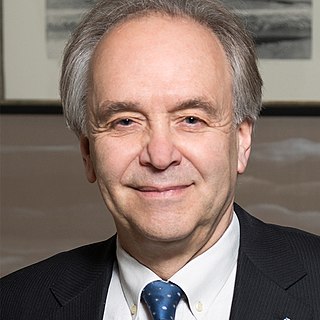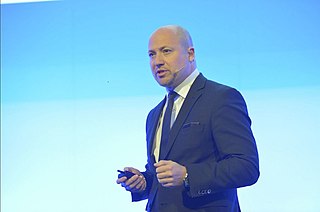Related Research Articles
A complex system is a system composed of many components which may interact with each other. Examples of complex systems are Earth's global climate, organisms, the human brain, infrastructure such as power grid, transportation or communication systems, complex software and electronic systems, social and economic organizations, an ecosystem, a living cell, and ultimately the entire universe.

Vienna is the capital, largest city, and one of nine federal states of Austria. Vienna is Austria's most populous city and its primate city, with about two million inhabitants, and its cultural, economic, and political center. It is the fifth-largest city proper by population in the European Union and the largest of all cities on the Danube river by population.

Stuart Alan Kauffman is an American medical doctor, theoretical biologist, and complex systems researcher who studies the origin of life on Earth. He was a professor at the University of Chicago, University of Pennsylvania, and University of Calgary. He is currently emeritus professor of biochemistry at the University of Pennsylvania and affiliate faculty at the Institute for Systems Biology. He has a number of awards including a MacArthur Fellowship and a Wiener Medal.
The New England Complex Systems Institute (NECSI) is an independent American research institution and think tank dedicated to advancing analytics and its application to the challenges of society, and the interaction of complex systems with the environment. NECSI offers educational programs, conducts research, and hosts the International Conference on Complex Systems. It was founded in 1996 and is located in Cambridge, Massachusetts.

The University of Klagenfurt is a federal Austrian research university and the largest research and higher education institution in the state of Carinthia. It has its campus in Klagenfurt.

J. Doyne Farmer is an American complex systems scientist and entrepreneur with interests in chaos theory, complexity and econophysics. He is Baillie Gifford Professor of Complex Systems Science at the Smith School of Enterprise and the Environment, Oxford University, where he is also director of the Complexity Economics programme at the Institute for New Economic Thinking at the Oxford Martin School. Additionally he is an external professor at the Santa Fe Institute. His current research is on complexity economics, focusing on systemic risk in financial markets and technological progress. During his career he has made important contributions to complex systems, chaos, artificial life, theoretical biology, time series forecasting and econophysics. He co-founded Prediction Company, one of the first companies to do fully automated quantitative trading. While a graduate student he led a group that called itself Eudaemonic Enterprises and built the first wearable digital computer, which was used to beat the game of roulette.

Barry Smith is an academic working in the fields of ontology and biomedical informatics. Smith is the author of more than 700 scientific publications, including 15 authored or edited books, and he is one of the most widely cited living philosophers.

Guido Caldarelli is an Italian physicist and full professor in Theoretical Physics at Ca' Foscari University of Venice.
Bernhard Scheid is an Austrian historian, academic, and Japanologist, affiliated to the Austrian Academy of Sciences and the Institute of East Asian Studies at the University of Vienna. In addition, Scheid counts among the Austrian top players of the game of Go.

J. Stephen Lansing is an American anthropologist and complexity scientist. He is especially known from his decades of research on the emergent properties of human-environmental interactions in Bali, Borneo and the Malay Archipelago; social-ecological modeling, and complex adaptive systems. He is an external professor at the Santa Fe Institute and the Complexity Science Hub Vienna; a Fellow at the Center for Advanced Study in the Behavioral Sciences at Stanford; a visiting scholar at the Hoffman Global Institute for Business and Society at INSEAD Singapore, and emeritus professor of anthropology at the University of Arizona.
Systemic design is an interdiscipline that integrates systems thinking and design practices. It is a pluralistic field, with several dialects including systems-oriented design. Influences have included critical systems thinking and second-order cybernetics. In 2021, the Design Council (UK) began advocating for a systemic design approach and embedded it in a revision of their double diamond model.
Stefan Szeider is an Austrian computer scientist who works on the areas of algorithms, computational complexity, theoretical computer science, and more specifically on propositional satisfiability, constraint satisfaction problems, and parameterised complexity. He is a full professor at the Faculty of Informatics at the Vienna University of Technology, the head of the Algorithms and Complexity Group, and co-chair of the Vienna Center for Logic and Algorithms (VCLA) of TU Wien.
Felix Tretter is an Austrian psychologist and psychiatrist. From 1992 to 2014 he was head of the addiction department of the Isar-Amper-Klinikum München-Ost, formerly known as Bezirkskrankenhaus Haar, Bavaria, Germany. His scientific work has emphasis on modelling of psychophysical scenarios in schizophrenia and addiction research with methods of systems science.
The Complexity Science Hub Vienna (CSH) is a Vienna-based research organisation with the aim to bundle, coordinate and advance the research of complex systems, system analysis and big data science in Austria.

Oliver Vitouch is an Austrian psychologist and cognitive scientist. He has served as Rector of the University of Klagenfurt since 2012, and as President and Vice-President, respectively, of Universities Austria since 2016.

Karl Nehammer is an Austrian politician who is the 32nd and current chancellor of Austria since 6 December 2021. A member of the Austrian People's Party (ÖVP), he previously was Minister of the Interior from 2020 to 2021, general secretary of the ÖVP from 2018 to 2020, as well as a member of the National Council from 2017 to 2020. Nehammer assumed the chancellorship as the successor of Alexander Schallenberg, who resigned to return as Minister of Foreign Affairs.

Election forensics are methods used to determine if election results are statistically normal or statistically abnormal, which can indicate electoral fraud. It uses statistical tools to determine if observed election results differ from normally occurring patterns. These tools can be relatively simple, such as looking at the frequency of integers and using 2nd Digit Benford's law, or can be more complex and involve machine learning techniques.

Klaus Mainzer is a German philosopher and scientist. Mainzer is the president of the European Academy of Sciences and Arts. He is the author of the widely translated, cited, and reviewed book Thinking in Complexity.

Tobias Thomas is a German economist and Director General of Statistics Austria.
References
- ↑ "Ich sitze zwischen allen Stühlen". Der Standard. May 30, 2006. Retrieved March 11, 2019.
- ↑ "Rechenkünstler". profil. March 23, 2006.
- ↑ "Section for Science of Complex Systems".
- ↑ "Komplexitätsforschung: Auf der Reise durch eine komplexe Welt". Der Standard. Aug 21, 2014. Retrieved March 11, 2019.
- ↑ "Start für "Complexity Science Hub Vienna"". ORF Science. July 28, 2015. Retrieved March 11, 2019.
- ↑ "Wien soll zur Drehscheibe für Komplexitätsforschung werden". Tiroler Tageszeitung. Feb 11, 2015. Retrieved March 11, 2019.
- ↑ "Vernetzte Welt: Complexity-Science-Hub wird im Mai eröffnet". Der Standard. March 19, 2016. Retrieved March 11, 2019.
- ↑ "Thurner, Hanel, and Klimek write the book on complex systems". Santa Fe Institute. Oct 26, 2018. Retrieved Nov 21, 2018.
- ↑ "Wie ein Physiker die Finanzmärkte retten will". Immovation. March 25, 2015. Retrieved March 11, 2019.
- ↑ "Die bessere Steuer". Süddeutsche Zeitung. Nov 25, 2014. Retrieved Nov 21, 2018.
- ↑ Buchanan, Mark (Feb 11, 2013). "Fix Finance by Shedding Light on Its Complexities". Bloomberg. Retrieved Nov 21, 2018.
- ↑ Buchanan, Mark (Oct 1, 2008). "This Economy Does Not Compute". The New York Times. Retrieved Nov 21, 2018.
- ↑ Buchanan, Mark (Feb 24, 2014). "Make banks safer: tax them". Bloomberg. Retrieved Nov 21, 2018.
- ↑ "Komplexitätsforscher Stefan Thurner". ORF. Jan 8, 2018. Retrieved Nov 21, 2018.
- ↑ "Stefan Thurner "wollte als Kind sehr gescheit werden"". APA Science. Jan 8, 2018. Retrieved Nov 21, 2018.